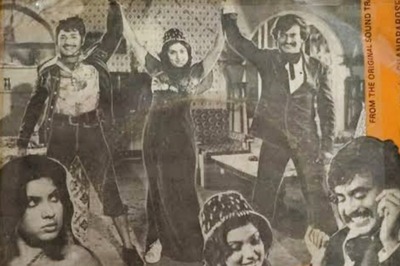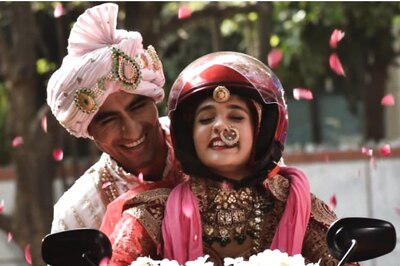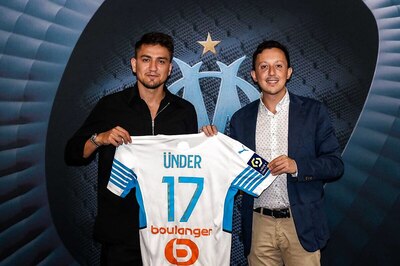
views
Sanaa, Yemen: Yemen's embattled president, looking weakened and stiff, on Thursday made his first public appearance since he was injured in a blast on his palace compound last month, in an apparent bid to dispel growing speculation about his condition.
President Ali Abdullah Saleh, who is undergoing treatment in Saudi Arabia, lashed out at opponents seeking to oust him from power, but his dramatically changed appearance belied his show of defiance.
White plaster casts covered his arms and hands, and his face appeared noticeably darker and thinner than before the attack. He sported a short beard and his hair was covered with a red-and-white-checkered Arab headdress cloth, both unusual for the clean-shaven, suit-wearing leader.
In a prerecorded video statement, Saleh said he'd undergone more than eight "successful operations," but did not say if and when he would return to Yemen.
The leader of Yemen's ruling party, who is close to Saleh, said the president's brief speech helped set the record straight. "His mere appearance on TV has clarified things for people and silenced many tongues by showing that the president is in good health," said the politician, Yasser Yemani.
However, Mohammed al-Thahiri, a protest leader in the Yemeni capital of Sanaa, said Saleh's career is over. "It’s clear form the way that he looks that he can't come back. This man is no longer able to rule the country," said al-Thahiri.
Wearing a white robe and sitting rigidly in an armchair, Saleh accused "terrorist elements" of carrying out the June 3 attack. He said dialogue is the only way out of the political crisis that has brought this impoverished corner of the Arabian Peninsula to the brink of civil war.
"Where are the conscious people? Where are the honest people? Where are the believers and the men who fear Allah? Why don't they stand with dialogue?" he said. "They should stand with dialogue so we can find solutions."
"Many have understood democracy incorrectly, through incorrect practices," Saleh said in the seven-minute video recorded in Saudi Arabia and broadcast on Yemen state TV. He accused his opponents of practicing the politics of "hijacking" and "arm-twisting" while describing himself as a defender of democracy and stability.
"We love participation, though the constitution, though the law," he said.
Saleh did not mention the US-backed proposal by Yemen's powerful Gulf Arab neighbors that would see him transfer power in exchange for immunity from prosecution.
Before his injury, Saleh repeatedly refused to sign the proposal.
More than four months of popular uprising seeking to end his rule have battered Yemen's economy, spread instability and caused the United States to turn away from Saleh, once considered a key ally in fighting Yemen's active al-Qaida branch. Many worry al-Qaida could exploit instability in Yemen to expand its operations.
Illustrating the threat, security officials said on Thursday that Islamist fighters killed 10 Yemeni soldiers execution-style after stopping their bus at a fake checkpoint. Wednesday's attack was carried out in the southern province of Abyan, where militants have already seized control of two towns.
In the capital Sanaa, the crackle of gunfire rang out when Saleh appeared on TV, as security forces and Saleh supporters fired in the air. Sanaa protest leader Abdel-Hadi al-Azazi said a small explosion went off in the public square where protesters have camped out injured six people. Its cause remained unclear.
Elsewhere, activists said security forces fired on protest camps in the cities of Taiz and Ibb, where activist Ahmed Aqeel said one protester was killed and dozens were injured.
Saleh last addressed his people in an audio message on state TV before leaving for Saudi Arabia on June 5. His long absence from the public eye raised wide speculation about the severity of his wounds and if they would prevent him from returning to Yemen.
Opposition party activist Hassan Zaid said Saleh's appearance Thursday confirmed that he will not return to Yemen soon, increasing the need for a political transition. "We now have a duty to act quickly and avoid the Somaliazation of Yemen," he said, referring to fears that instability will lead to chaos. "We need a fast transition to the vice president and the formation of a transitional council."
Forty-year-old teacher Sadeq Omar, who watched the speech with friends, said he was shocked by Saleh's appearance.
"The president seemed really injured. Even his face looked different," he said. "He didn't speak as powerfully as he did before."
Protesters who have camped out in public squares across Yemen and faced deadly crackdowns by Saleh's security forces said Saleh's speech would not deter them in their quest to push him out.
"We'll continue our peaceful revolution until we reach our goals," said al-Thahiri, the Sanaa protest leader. "As for Saleh, his political career is finished."




















Comments
0 comment